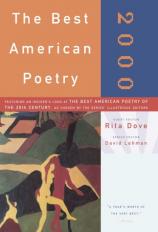The Best American Poetry 2000
Review
The Best American Poetry 2000
Read an Excerpt![]() This
This
collection of poems, by both unknown and established poets, is a
wonderful (re)introduction to some of the best contemporary
American poets writing today. Series editor David Lehman has taken
an evenhanded approach with these books --- since 1988, he has
selected a new editor every year to choose what he or she feels are
the best poems of the year.Organized alphabetically by poet, so as not to distinguish the
strength of the poems by their placement in the book, this
collection includes works discovered in literary magazines such as
Boulevard, The Georgia Review, Tri Quarterly, Callaloo,
Ploughshares, and The New Yorker. Lehman's foreword explains that
the poems in this volume blend the popular and the literary.
Illustrated by the emergence of poetry on subways, TV
advertisements, and the Internet, and alternate forms of expression
such as poetry and music, performance poetry, and poetry "slang,"
among other innovations, it's clear that there are no longer set
boundaries and, as always, rules are made to be broken. Poetry has
always been a rebellious art form, this new frontier of poetry a
testimony to free expression. A wonderful introduction by Pulitzer
Prize winning poet Rita Dove explains the difficulties and rewards
of choosing the poems that have made the final cut.Although each has its merit, there are a handful here that
particularly stuck out for me. There was something to be gained
from reading each of these poems, but I'll highlight my favorites
here:"Seven Roses" by Frank X. Gaspar begins with the simple image
of flowers at the breakfast table, "Three red, one white, one
purple, one yellow, one pink." The image of the roses sparks a
meditation on beauty, which brings Gaspar to the realization that
"The truth about life is that it is good, but it comes with strings
attached."In
Billy Collins's poem, "Man Listening to Disc," an event as regular
as listening to jazz on a CD Discman while walking down a New York
City street is revealed as a way to put a secret soundtrack to your
life. Here, our narrator becomes empowered by the music that only
he can hear, reflecting further on his place in the world while
striding through the crowds of New Yorkers who, as he rightly says,
"mistake themselves for the center of the universe.""Immigrant Picnic" by Gregory Djanikian paints a brilliant
scene of a family picnic at which the ostentatious Americanized son
is so bold as to roll his eyes and correct his mother's
grammar!In
"Alpha Images" Karl Elder recites the alphabet and talks about what
he sees in the curves and lines that make up each letter. In
describing the capital letter 'M' for example, Elder writes
"Dragging its belly,/ a mechanical spider,/ its nose to the
ground." Or, the letter 'O,' "The rim of the moon./ Peephole into
an igloo./ Shadow of a zero."In
Susan Woods's "Analysis of the Rose as Sentimental Despair" she
riffs on her impressions of a contemporary painting (Cy Twombley,
set of five paintings, 1985). It is a somber poem about the ironies
of falling in love with a memory. Wood writes, "(loving the Idea,
but not the Thing itself),/ loving the memory of rose petals/
strewn across a bed, but not/ the rumpled, semen-stained sheets."
Thinking about other poets like Rumi, Rilke, and Leopardi, Wood
concludes that all poems are elegies.I
hadn't read poetry for a while before coming to this collection,
and reading it has reminded me of what I've always known: how easy
it is to fall in love with words. In every thing, in each of the
small details that we encounter in the expression of life, there is
something larger that we can't quite put a finger on. In this
magnification of small things that can oftentimes, at the surface,
seem mundane, poetry exalts the glory of language and the
possibilities in every moment.It
is difficult to get people to read a book of poetry by someone they
have never heard of. Poetry can be esoteric, as proved by many of
these poems. But it can also stretch your imagination beyond its
limits. This introduction to 75 new voices will be reaffirming to
poetry lovers, poetry dabblers, and to the poets themselves. I
think it's safe to say that poetry, in it's many forms, touches
more people now than ever before. And though, of course, you won't
love every poem, you will love many of them. And even in those that
you find only mediocre, you will discover breathtaking nuances and
moments that invite you to stop and savor their
richness.
Reviewed by Melanie Okadigwe on January 21, 2011
The Best American Poetry 2000
- Publication Date: September 19, 2000
- Hardcover: 285 pages
- Publisher: Scribner Poetry
- ISBN-10: 0684842815
- ISBN-13: 9780684842813



